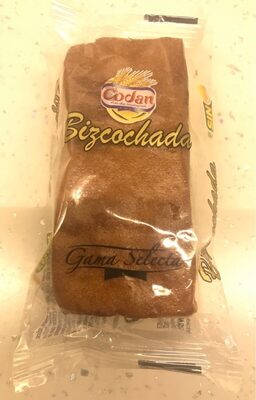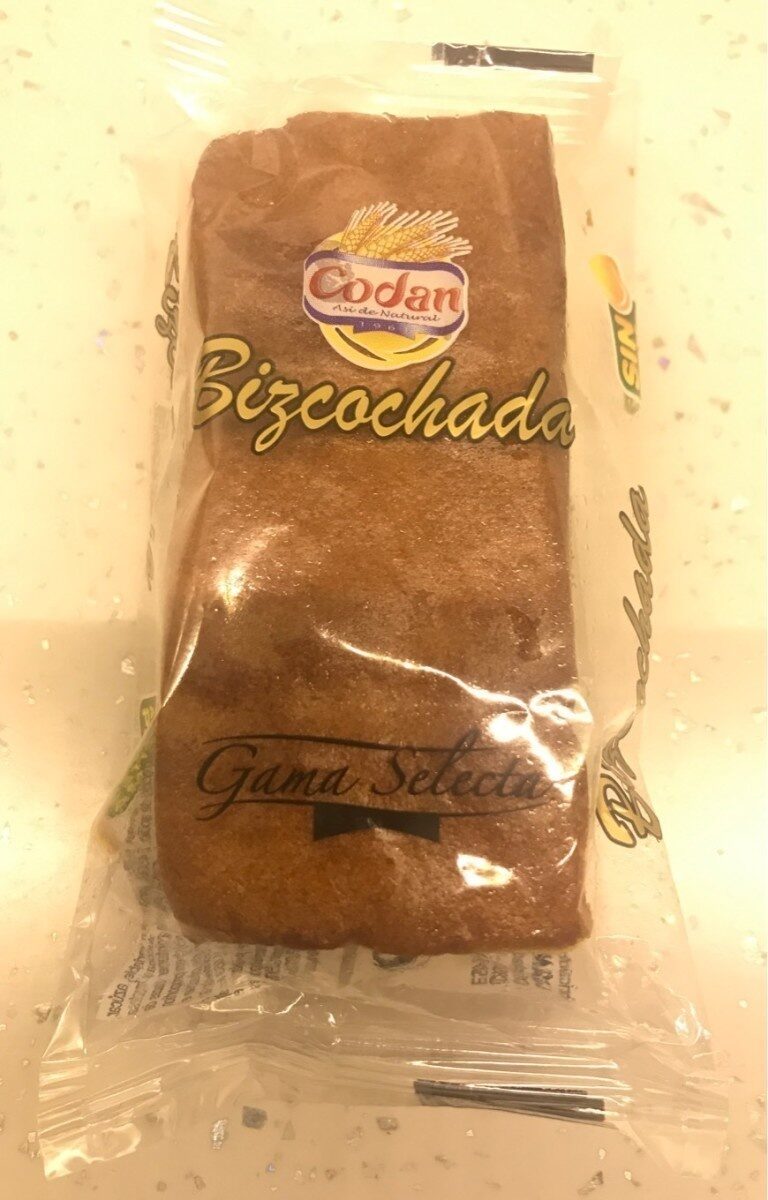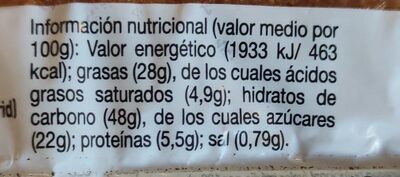Help us make food transparency the norm!
As a non-profit organization, we depend on your donations to continue informing consumers around the world about what they eat.
The food revolution starts with you!
Bizcochada - Codan - 50g
Bizcochada - Codan - 50g
This product page is not complete. You can help to complete it by editing it and adding more data from the photos we have, or by taking more photos using the app for Android or iPhone/iPad. Thank you!
×
Barcode: 8410368003353 (EAN / EAN-13)
Quantity: 50g
Packaging: Plastic
Brands: Codan
Categories: Snacks, Sweet snacks, Biscuits and cakes, Cakes, Pound Cake
Labels, certifications, awards: No palm oil, es:Bollería industrial
Origin of ingredients: Spain
Manufacturing or processing places: España
Countries where sold: Spain
Matching with your preferences
Health
Ingredients
-
26 ingredients
: Harina de TRIGO, aceite vegetal (girasol, soja) en proporción variable, azúcar, HUEVO,estabilizantes (glicerol, E466), MANTEQUILLA, gasificantes (carbonato ácido de sodio, E450ii), jarabe de glucosa y fructosa ,Suero de LECHE, emulgentes (E471, E475) conservadores (E282, E202), sal, aroma y acidulante (E334).Allergens: Eggs, Gluten, Milk, SoybeansTraces: Nuts, Soybeans
Food processing
-
Ultra processed foods
Elements that indicate the product is in the 4 - Ultra processed food and drink products group:
- Additive: E422 - Glycerol
- Additive: E450 - Diphosphates
- Additive: E466 - Sodium carboxy methyl cellulose
- Additive: E471 - Mono- and diglycerides of fatty acids
- Additive: E475 - Polyglycerol esters of fatty acids
- Ingredient: Emulsifier
- Ingredient: Flavouring
- Ingredient: Glucose
- Ingredient: Whey
Food products are classified into 4 groups according to their degree of processing:
- Unprocessed or minimally processed foods
- Processed culinary ingredients
- Processed foods
- Ultra processed foods
The determination of the group is based on the category of the product and on the ingredients it contains.
Additives
-
E202 - Potassium sorbate
Potassium sorbate (E202) is a synthetic food preservative commonly used to extend the shelf life of various food products.
It works by inhibiting the growth of molds, yeast, and some bacteria, preventing spoilage. When added to foods, it helps maintain their freshness and quality.
Some studies have shown that when combined with nitrites, potassium sorbate have genotoxic activity in vitro. However, potassium sorbate is generally recognized as safe (GRAS) by regulatory authorities.
-
E282 - Calcium propionate
Calcium propanoate: Calcium propanoate or calcium propionate has the formula Ca-C2H5COO-2. It is the calcium salt of propanoic acid.Source: Wikipedia
-
E334 - L(+)-tartaric acid
Tartaric acid: Tartaric acid is a white, crystalline organic acid that occurs naturally in many fruits, most notably in grapes, but also in bananas, tamarinds, and citrus. Its salt, potassium bitartrate, commonly known as cream of tartar, develops naturally in the process of winemaking. It is commonly mixed with sodium bicarbonate and is sold as baking powder used as a leavening agent in food preparation. The acid itself is added to foods as an antioxidant and to impart its distinctive sour taste. Tartaric is an alpha-hydroxy-carboxylic acid, is diprotic and aldaric in acid characteristics, and is a dihydroxyl derivative of succinic acid.Source: Wikipedia
-
E422 - Glycerol
Glycerol: Glycerol -; also called glycerine or glycerin; see spelling differences- is a simple polyol compound. It is a colorless, odorless, viscous liquid that is sweet-tasting and non-toxic. The glycerol backbone is found in all lipids known as triglycerides. It is widely used in the food industry as a sweetener and humectant and in pharmaceutical formulations. Glycerol has three hydroxyl groups that are responsible for its solubility in water and its hygroscopic nature.Source: Wikipedia
-
E450 - Diphosphates
Diphosphates (E450) are food additives often utilized to modify the texture of products, acting as leavening agents in baking and preventing the coagulation of canned food.
These salts can stabilize whipped cream and are also found in powdered products to maintain their flow properties. They are commonly present in baked goods, processed meats, and soft drinks.
Derived from phosphoric acid, they're part of our daily phosphate intake, which often surpasses recommended levels due to the prevalence of phosphates in processed foods and drinks.
Excessive phosphate consumption is linked to health issues, such as impaired kidney function and weakened bone health. Though diphosphates are generally regarded as safe when consumed within established acceptable daily intakes, it's imperative to monitor overall phosphate consumption to maintain optimal health.
-
E466 - Sodium carboxy methyl cellulose
Carboxymethyl cellulose: Carboxymethyl cellulose -CMC- or cellulose gum or tylose powder is a cellulose derivative with carboxymethyl groups --CH2-COOH- bound to some of the hydroxyl groups of the glucopyranose monomers that make up the cellulose backbone. It is often used as its sodium salt, sodium carboxymethyl cellulose.Source: Wikipedia
-
E471 - Mono- and diglycerides of fatty acids
Mono- and diglycerides of fatty acids (E471), are food additives commonly used as emulsifiers in various processed foods.
These compounds consist of glycerol molecules linked to one or two fatty acid chains, which help stabilize and blend water and oil-based ingredients. E471 enhances the texture and shelf life of products like margarine, baked goods, and ice cream, ensuring a smooth and consistent texture.
It is generally considered safe for consumption within established regulatory limits.
-
E500 - Sodium carbonates
Sodium carbonates (E500) are compounds commonly used in food preparation as leavening agents, helping baked goods rise by releasing carbon dioxide when they interact with acids.
Often found in baking soda, they regulate the pH of food, preventing it from becoming too acidic or too alkaline. In the culinary world, sodium carbonates can also enhance the texture and structure of foods, such as noodles, by modifying the gluten network.
Generally recognized as safe, sodium carbonates are non-toxic when consumed in typical amounts found in food.
-
E500ii - Sodium hydrogen carbonate
Sodium hydrogen carbonate, also known as E500ii, is a food additive commonly used as a leavening agent.
When added to recipes, it releases carbon dioxide gas upon exposure to heat or acids, causing dough to rise and resulting in a light, fluffy texture in baked goods.
It is generally recognized as safe (GRAS) by regulatory authorities when used in appropriate quantities and poses no significant health risks when consumed in typical food applications.
Ingredients analysis
-
May contain palm oil
Ingredients that may contain palm oil: E471
-
Non-vegan
Non-vegan ingredients: Egg, Butter, WheySome ingredients could not be recognized.
We need your help!
You can help us recognize more ingredients and better analyze the list of ingredients for this product and others:
- Edit this product page to correct spelling mistakes in the ingredients list, and/or to remove ingredients in other languages and sentences that are not related to the ingredients.
- Add new entries, synonyms or translations to our multilingual lists of ingredients, ingredient processing methods, and labels.
If you would like to help, join the #ingredients channel on our Slack discussion space and/or learn about ingredients analysis on our wiki. Thank you!
-
Vegetarian status unknown
Unrecognized ingredients: es:en-proporcion-variableSome ingredients could not be recognized.
We need your help!
You can help us recognize more ingredients and better analyze the list of ingredients for this product and others:
- Edit this product page to correct spelling mistakes in the ingredients list, and/or to remove ingredients in other languages and sentences that are not related to the ingredients.
- Add new entries, synonyms or translations to our multilingual lists of ingredients, ingredient processing methods, and labels.
If you would like to help, join the #ingredients channel on our Slack discussion space and/or learn about ingredients analysis on our wiki. Thank you!
-
Details of the analysis of the ingredients
We need your help!
Some ingredients could not be recognized.
We need your help!
You can help us recognize more ingredients and better analyze the list of ingredients for this product and others:
- Edit this product page to correct spelling mistakes in the ingredients list, and/or to remove ingredients in other languages and sentences that are not related to the ingredients.
- Add new entries, synonyms or translations to our multilingual lists of ingredients, ingredient processing methods, and labels.
If you would like to help, join the #ingredients channel on our Slack discussion space and/or learn about ingredients analysis on our wiki. Thank you!
: Harina de TRIGO, aceite vegetal (girasol, soja), en proporción variable, azúcar, HUEVO, estabilizantes (glicerol, e466), MANTEQUILLA, gasificantes (carbonato ácido de sodio, e450ii), jarabe de glucosa y fructosa, Suero de LECHE, emulgentes (e471, e475), conservadores (e282, e202), sal, aroma, acidulante (e334)- Harina de TRIGO -> en:wheat-flour - vegan: yes - vegetarian: yes - ciqual_proxy_food_code: 9410 - percent_min: 6.66666666666667 - percent_max: 100
- aceite vegetal -> en:vegetable-oil - vegan: yes - vegetarian: yes - from_palm_oil: maybe - percent_min: 0 - percent_max: 50
- girasol -> en:sunflower - vegan: yes - vegetarian: yes - percent_min: 0 - percent_max: 50
- soja -> en:soya - vegan: yes - vegetarian: yes - percent_min: 0 - percent_max: 25
- en proporción variable -> es:en-proporcion-variable - percent_min: 0 - percent_max: 33.3333333333333
- azúcar -> en:sugar - vegan: yes - vegetarian: yes - ciqual_proxy_food_code: 31016 - percent_min: 0 - percent_max: 22
- HUEVO -> en:egg - vegan: no - vegetarian: yes - ciqual_food_code: 22000 - percent_min: 0 - percent_max: 20
- estabilizantes -> en:stabiliser - percent_min: 0 - percent_max: 16.6666666666667
- glicerol -> en:e422 - vegan: maybe - vegetarian: maybe - percent_min: 0 - percent_max: 16.6666666666667
- e466 -> en:e466 - vegan: yes - vegetarian: yes - percent_min: 0 - percent_max: 8.33333333333333
- MANTEQUILLA -> en:butter - vegan: no - vegetarian: yes - ciqual_proxy_food_code: 16400 - percent_min: 0 - percent_max: 14.2857142857143
- gasificantes -> en:raising-agent - percent_min: 0 - percent_max: 12.5
- carbonato ácido de sodio -> en:e500ii - vegan: yes - vegetarian: yes - percent_min: 0 - percent_max: 12.5
- e450ii -> en:e450ii - vegan: yes - vegetarian: yes - percent_min: 0 - percent_max: 6.25
- jarabe de glucosa y fructosa -> en:glucose-fructose-syrup - vegan: yes - vegetarian: yes - ciqual_food_code: 31077 - percent_min: 0 - percent_max: 11.1111111111111
- Suero de LECHE -> en:whey - vegan: no - vegetarian: maybe - percent_min: 0 - percent_max: 10
- emulgentes -> en:emulsifier - percent_min: 0 - percent_max: 9.09090909090909
- e471 -> en:e471 - vegan: maybe - vegetarian: maybe - from_palm_oil: maybe - percent_min: 0 - percent_max: 9.09090909090909
- e475 -> en:e475 - vegan: maybe - vegetarian: maybe - percent_min: 0 - percent_max: 4.54545454545455
- conservadores -> en:preservative - percent_min: 0 - percent_max: 8.33333333333333
- e282 -> en:e282 - vegan: yes - vegetarian: yes - percent_min: 0 - percent_max: 8.33333333333333
- e202 -> en:e202 - vegan: yes - vegetarian: yes - percent_min: 0 - percent_max: 4.16666666666667
- sal -> en:salt - vegan: yes - vegetarian: yes - ciqual_food_code: 11058 - percent_min: 0 - percent_max: 0.79
- aroma -> en:flavouring - vegan: maybe - vegetarian: maybe - percent_min: 0 - percent_max: 0.79
- acidulante -> en:acid - percent_min: 0 - percent_max: 0.79
- e334 -> en:e334 - vegan: yes - vegetarian: yes - percent_min: 0 - percent_max: 0.79
Nutrition
-
Poor nutritional quality
⚠ ️Warning: the amount of fruits, vegetables and nuts is not specified on the label, it was estimated from the list of ingredients: 0This product is not considered a beverage for the calculation of the Nutri-Score.
Positive points: 0
- Proteins: 3 / 5 (value: 5.5, rounded value: 5.5)
- Fiber: 0 / 5 (value: 0, rounded value: 0)
- Fruits, vegetables, nuts, and colza/walnut/olive oils: 0 / 5 (value: 0, rounded value: 0)
Negative points: 16
- Energy: 5 / 10 (value: 1937, rounded value: 1937)
- Sugars: 4 / 10 (value: 22, rounded value: 22)
- Saturated fat: 4 / 10 (value: 4.9, rounded value: 4.9)
- Sodium: 3 / 10 (value: 316, rounded value: 316)
The points for proteins are not counted because the negative points are greater or equal to 11.
Nutritional score: (16 - 0)
Nutri-Score:
-
Nutrient levels
-
Fat in high quantity (28%)
What you need to know- A high consumption of fat, especially saturated fats, can raise cholesterol, which increases the risk of heart diseases.
Recommendation: Limit the consumption of fat and saturated fat- Choose products with lower fat and saturated fat content.
-
Saturated fat in moderate quantity (4.9%)
What you need to know- A high consumption of fat, especially saturated fats, can raise cholesterol, which increases the risk of heart diseases.
Recommendation: Limit the consumption of fat and saturated fat- Choose products with lower fat and saturated fat content.
-
Sugars in high quantity (22%)
What you need to know- A high consumption of sugar can cause weight gain and tooth decay. It also augments the risk of type 2 diabetes and cardio-vascular diseases.
Recommendation: Limit the consumption of sugar and sugary drinks- Sugary drinks (such as sodas, fruit beverages, and fruit juices and nectars) should be limited as much as possible (no more than 1 glass a day).
- Choose products with lower sugar content and reduce the consumption of products with added sugars.
-
Salt in moderate quantity (0.79%)
What you need to know- A high consumption of salt (or sodium) can cause raised blood pressure, which can increase the risk of heart disease and stroke.
- Many people who have high blood pressure do not know it, as there are often no symptoms.
- Most people consume too much salt (on average 9 to 12 grams per day), around twice the recommended maximum level of intake.
Recommendation: Limit the consumption of salt and salted food- Reduce the quantity of salt used when cooking, and don't salt again at the table.
- Limit the consumption of salty snacks and choose products with lower salt content.
-
-
Nutrition facts
Nutrition facts As sold
for 100 g / 100 mlAs sold
per serving (50g)Compared to: Pound Cake Energy 1,937 kj
(463 kcal)968 kj
(232 kcal)+11% Fat 28 g 14 g +28% Saturated fat 4.9 g 2.45 g -45% Carbohydrates 48 g 24 g -2% Sugars 22 g 11 g -20% Fiber 0 g 0 g -100% Proteins 5.5 g 2.75 g -2% Salt 0.79 g 0.395 g -8% Fruits‚ vegetables‚ nuts and rapeseed‚ walnut and olive oils (estimate from ingredients list analysis) 0 % 0 %
Environment
-
Eco-Score C - Moderate environmental impact
⚠ ️Select a country in order to include the full impact of transportation.The Eco-Score is an experimental score that summarizes the environmental impacts of food products.→ The Eco-Score was initially developped for France and it is being extended to other European countries. The Eco-Score formula is subject to change as it is regularly improved to make it more precise and better suited to each country.Life cycle analysis
-
Average impact of products of the same category: C (Score: 59/100)
Category: Pound cake, prepacked
Category: Pound cake, prepacked
- PEF environmental score: 0.44 (the lower the score, the lower the impact)
- including impact on climate change: 3.69 kg CO2 eq/kg of product
Stage Impact Agriculture
82.3 %Processing
9.7 %Packaging
4.3 %Transportation
2.6 %Distribution
1.1 %Consumption
0.0 %
Bonuses and maluses
-
Origins of ingredients with a medium impact
Bonus: +3
Environmental policy: +3
Transportation: 0
Origin of the product and/or its ingredients % of ingredients Impact Spain 100 %Medium
-
Packaging with a medium impact
Malus: -10
Shape Material Recycling Impact Unknown Plastic High ⚠ ️ The information about the packaging of this product is not sufficiently precise (exact shapes and materials of all components of the packaging).⚠ ️ For a more precise calculation of the Eco-Score, you can modify the product page and add them.
If you are the manufacturer of this product, you can send us the information with our free platform for producers.
Eco-Score for this product
-
Impact for this product: C (Score: 52/100)
Product: Bizcochada - Codan - 50g
Life cycle analysis score: 59
Sum of bonuses and maluses: -7
Final score: 52/100
-
Carbon footprint
-
Equal to driving 1.9 km in a petrol car
369 g CO² per 100g of product
The carbon emission figure comes from ADEME's Agribalyse database, for the category: Pound cake, prepacked (Source: ADEME Agribalyse Database)
Stage Impact Agriculture
81.6 %Processing
6.4 %Packaging
7.8 %Transportation
3.7 %Distribution
0.5 %Consumption
0.0 %
Packaging
-
Packaging with a medium impact
-
Packaging parts
(Plastic)
-
Packaging materials
Material % Packaging weight Packaging weight per 100 g of product Plastic
-
Transportation
-
Origins of ingredients
Origins of ingredients with a medium impact
Origin of the product and/or its ingredients % of ingredients Impact Spain 100 %Medium
Report a problem
-
Incomplete or incorrect information?
Category, labels, ingredients, allergens, nutritional information, photos etc.
If the information does not match the information on the packaging, please complete or correct it. Open Food Facts is a collaborative database, and every contribution is useful for all.
Data sources
Product added on by osimo
Last edit of product page on by kiliweb.
Product page also edited by acuario, musarana, openfoodfacts-contributors, packbot, yuka.U0lFaE5wa3RnTXRReDhjYy9UUHgyZTlmNjVHc2R6N3JDYk14SUE9PQ, yuka.VYJTPvCSH8wKHN_c1Z0-7BOQJufsPeVACSQ0og, yuka.sY2b0xO6T85zoF3NwEKvlhZ5QdOEmgDZbEDQwn-w59iKIKHYeYhj_6ygE6s, yuka.sY2b0xO6T85zoF3NwEKvlkFYD8H1uzDWKwTfsk-hxPWxBMO2T-wuvKbHbKs, yuka.sY2b0xO6T85zoF3NwEKvlmsYat7QuimbEUbVmHyC-PirLqPwWsAq4bTcHKs.










